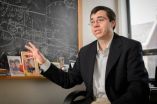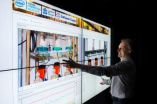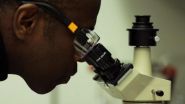(Press-News.org) EAST LANSING, Mich. — From Ethiopia to Nicaragua, countries that go through civil war are much less likely to become democratic if the winning side gets help from rival nations, a Michigan State University political scientist argues.
In a new study examining democratization after civil wars since World War II, Michael Colaresi found the majority of groups that eventually took power failed to establish democratic governments if those groups took money or weapons from a foreign enemy during the war.
Receiving such aid can create mistrust among the nation's citizens and make it more difficult for the new regime to institute a democracy, which requires public consent for effective governance, said Colaresi, professor of political science.
"Leaders want to stay in power," Colaresi said. "If they try to build democratic institutions, they would then need public support and trust to continue to govern, which is no easy task if you have received support from enemies the public does not trust."
The study, published in the Journal of Peace Research, is the first to show which events within a civil war can help to systematically forecast where post-conflict democratization is likely or unlikely to occur. Past research looked at factors such as the destructiveness of the war and whether the rebel group won, but failed to make a connection to future democracies.
Colaresi studied 136 civil wars from 1946 to 2009, 34 of which involved rivals aiding the winning side. Of those 34 countries, only one – Algeria – bucked the trend by becoming significantly more democratic over the next decade. The others either remained undemocratic or became substantially more repressive after the civil war.
This logic holds even if the public was unaware of the aid during the civil war. Colaresi noted that democracy in most cases involves greater transparency, holding elections, having a free press and an active legislature, meaning those previous unpopular ties eventually would become public – a disincentive to democratize.
In addition, anti-democratic effects of aid hold when the state providing support is itself democratic, such as the United States. "A tie to an unpopular external democracy," Colaresi said, "is still a potential electoral problem."
The findings have implications for world leaders trying to establish more democratic societies.
"If we want to build democracy and better human rights in the Middle East and other places," Colaresi said, "we have to understand why groups accept aid from rival nations and help to create incentives that drive it out or at least counterincentives to build new governance."
INFORMATION:
The study is titled "With friends like these, who needs democracy? The effect of transnational support from rivals on post-conflict democratization."
With friends like these, who needs democracy?
2014-02-20
ELSE PRESS RELEASES FROM THIS DATE:
Sustainable use of energy wood resources shows potential in North-West Russia
2014-02-20
Nowadays, humanity faces many challenges; the most serious are poverty, the growing demand for resources and the deterioration of the environment. In order to satisfy the growing demand for wood, forestry in many countries has to be intensified. The forests of the Russian Federation are the world's largest reserve of wood for different purposes. Intensification of forestry in Russia will result in increasing availability of wood for material and energy uses.
A doctoral dissertation completed at the University of Eastern Finland analysed the potential of energy wood resources ...
From a distance: New technique for repair work
2014-02-20
This news release is available in German.
Numerous German companies are operating globally these days: They develop products domestically, but production is done in other countries like China, Brazil or the Czech Republic. If maintenance or repair work is needed, the engineers who had designed the complex production plants frequently have to travel from Germany.
A novel approach by computer scientists in the research group of professor Thorsten Herfet from the Chair of Telecommunications at Saarland University could provide a solution: a platform that brings together ...
Researching Facebook business
2014-02-20
Establishing and maintaining relationships online is becoming ever more important in the expanding global knowledge economy. But what happens to the relationship between business and consumer when a user "unfriends"? Writing in the International Journal of the Business Environment, Christopher Sibona and Steven Walczak of The Business School, at the University of Colorado Denver, USA, have found that there are many online and offline reasons why a person might "unfriend" another party.
The team has examined these factors and offer insights into how virtual business relationships ...
Gathering the clues to rare gene variants contributing to schizophrenia
2014-02-20
Philadelphia, PA, February 20, 2014 – Schizophrenia has long been known to be highly heritable and is present in approximately 1% of the population. Researchers have been following two paths in their pursuit of identifying schizophrenia risk genes.
Initially, they studied common gene variants that, individually, only increase the risk for schizophrenia by a few percent, perhaps increasing the likelihood of developing schizophrenia from a 10 out of a 1000 chance to an 11 or 12 out of a 1000 chance.
More recently, research has identified gene variants that are rare in ...
Spotlighting black chemists and chemical engineers (video)
2014-02-20
WASHINGTON, Feb. 20, 2014 — Their research may lead to a new generation of renewable fuels, medical devices and safer home products. The American Chemical Society (ACS) is continuing its celebration of Black History Month with a new video featuring several African-American chemists and chemical engineers doing cutting edge research today. The video is available at http://youtu.be/v0PmKbJNAQI.
The video, produced with the National Organization for the Professional Advancement of Black Chemists and Chemical Engineers (NOBCChE), highlights the efforts of Kristala Prather, ...
High cost of fruits, vegetables linked to higher body fat in young children
2014-02-20
Washington, D.C.--High prices for fresh fruits and vegetables are associated with higher Body Mass Index (BMI) in young children in low- and middle-income households, according to American University researchers in the journal Pediatrics.
"There is a small, but significant, association between the prices of fruit and vegetables and higher child BMI," said Taryn Morrissey, the study's lead author and assistant professor of public administration and policy at AU's School of Public Affairs (SPA).
Morrissey said that when the prices of fruits and vegetables go up, families ...
Cell behavior in low oxygen conditions mapped
2014-02-20
LIVERPOOL, UK – 17 February 2014: Research at the University of Liverpool has explained how cells behave when placed in a low oxygen environment, a development that could have implications for cancer patients and other serious illnesses.
The research opens up the possibility of controlling the signals that keep cells alive, preventing the damages caused by ischemia – a restriction of blood supply to tissues. It could also work to help destroy cancer cells.
When the body is deprived of adequate oxygen supply it is known as hypoxia and can cause the death of cells. This ...
Astronomers find solar storms behave like supernovae
2014-02-20
Researchers at UCL have studied the behaviour of the Sun's coronal mass ejections, explaining for the first time the details of how these huge eruptions behave as they fall back onto the Sun's surface. In the process, they have discovered that coronal mass ejections have a surprising twin in the depths of space: the tendrils of gas in the Crab Nebula, which lie 6500 light-years away and are millions of times larger.
On 7 June 2011, the biggest ejection of material ever observed erupted from the surface of the Sun. Over the days that followed, the plasma belched out ...
High potency statins linked to better outcome following a heart attack
2014-02-20
A study looking at the data of thousands of patients who suffered heart attacks has suggested treatment with high-potency statins offers a significantly improved chance of survival compared to those taking normal statins.
The study, led by the University of Dundee, also found a combination of statins and the drug ezetimibe showed no improved survival rate, although researchers caution this finding needs further testing.
"There is presently a lot of interest in ezetimibe as a potential treatment for heart patients," said Professor Chim Lang, from the Division of Cardiovascular ...
Mistaken point, Sanctuary of Zeus, catastrophic outburst floods, shocked sand grains
2014-02-20
Boulder, Colo., USA – GSA Bulletin postings for February cover the sculpting of Earth's surface as seen in the Pyrenees; facies architecture in Washington State, USA; atmospheric circulation recorded in the Permian Maroon Formation; preglacial fluvial gorges and valleys; banded iron formations; paleosols in Wapadsberg Pass, South Africa; Ediacaran fossils from Mistaken Point, Newfoundland; geologic forensics and sedimentary fingerprints; catastrophic outburst floods recorded in the Tibetan Plateau; the Sudbury impact structure, Canada; and observations at the Sanctuary ...



